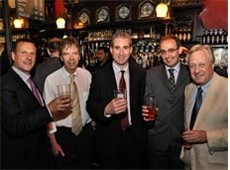'Restrictive covenants on pubs a disgrace'

Restrictive covenants on pubs being sold are a "revolver to the head" of local authorities but small changes in planning could make a huge difference to the number of pubs closing.
That was the clear message from the Campaign for Real Ale (Camra) as it outlined ways the Government could change planning law to help protect pubs to the Parliamentary Save the Pub Group.
Camra said that planning policy needs to recognise that pubs, in both urban and rural locations, can be the "cornerstone of community life". Currently, 31% of permanently closed pubs are demolished and 36% are converted into restaurants, shops or cafes — none of which require planning permission or change of use and leave the community without a say. A further 33% are converted for other use, mainly residential.
Restrictive covenants prevent a pub being operated as a pub when it is sold. "Local authorities have a Hobson's choice with restrictive covenants," said Camra director of public affairs Jonathan Mail. "They can allow change of use and lose the pub or refuse and the pub remains closed because of the restrictive covenant."
He estimated that 70% of pubs sold by Enterprise were with restrictive covenants — a practice which the pubco has now agreed to end. Mail said that the industry had a "big opportunity" to rid itself of restrictive covenants during a consultation on banning the practice in the supermarket sector later this year.
Mail said that secondary legislation in four areas would have a "big impact". They are:
• Require that change of use to a shop or cafe requires planning permission
• Require planning permission for demolishing pubs
• Ban the sale of pubs with restrictive covenants
• Require local authorities to take action against closed pubs being used for residential purposes at an early stage
He recommended that a Private Members Bill either to force a national policy on local authorities or to give discretionary powers to local authorities could also be another route to explore.
Save the Pub Group chair Greg Mulholland said he would ask the group's members if they would consider sponsoring such a bill but he favoured a national policy.
"Two-thirds of pubs close where there is no need for planning permission — that is scandalous," said the Lib Dem MP.
"Many decisions about pubs are made by companies in distant HQs, whose main concern is their share prices, and not in the local communities.
"Restrictive covenants are an absolute disgrace and any company that uses them has no concern for the future of the British pub — only self interest and maximising profits."
He added: "The question is who owns the pubs? Morally the community does but the sad reality is it is very simple — it's whose ever name is on the deeds."
"We need a separate planning category for pubs to enshrine them in British law."
Sustainable communities
Meanwhile, Camra chief executive Mike Benner urged local authorities to sign up to the Sustainable Communities Act to help protect pubs. The Act recognises pubs as local services and Benner hailed it as a "revolutionary bit of legislation".
He said: "It is unprecedented and a clear opportunity to help save pubs."
Currently, one-third of councils have signed up to the Act. Benner said he would like to see action in the following areas:
• Extended rate relief
• Making restrictive covenants illegal
• Guest beer provision
• Minimum pricing
• Planning permission for demolition of pubs
• A right to buy for tenants when the pub comes up for sale
• Use of Camra's viability test to judge whether a pub could still operate profitably
• Reverting the increases in beer duty
Former sports minister Kate Hoey is the latest member to join the Save the Pub Group following her meeting with constituent and Enterprise tenant Steve Slatter.














